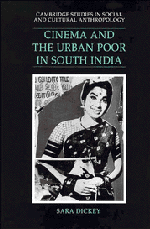1 - Introduction
from Part I
Published online by Cambridge University Press: 24 October 2009
Summary
In the city of Madurai, cinema is everywhere. Glittering billboards advertise the latest films, and smaller posters are slapped on to spare inches of wall space. Movie songs blare from horn speakers and cassette players at weddings, puberty rites, and temple and shrine festivals. Tapes of movie dialogues play at coffee stalls, while patrons join in reciting them. Rickshaws and shop boards are painted with movie stars' pictures. Young men and women follow dress and hairstyle fashions dictated by the latest films. Younger children trade movie star cards, learn to disco dance like the film actors, and recreate heroic battles in imitation of their favorite stars. Fan club members meet in the streets to boast about their star and make fun of his rivals.
The visual and aural presence of cinema in this part of South India (see map for location of Madurai) is matched by one of the highest production and filmwatching rates in the world. India regularly produces more films than any other country (see Dharap 1985: 626; Thomas 1985: 116), and of the three major centers for film production within India, the southern industry in Madras is the largest in terms of number of studios, capital investment, gross income, and number of people engaged in production. It was reported in 1975 that one fourth of all India's cinema houses are in the state of Tamil Nadu (Hardgrave and Neidhart 1975: 27); by 1990, when Tamil Nadu had 2,431 cinema theaters, this proportion still held.
- Type
- Chapter
- Information
- Cinema and the Urban Poor in South India , pp. 3 - 14Publisher: Cambridge University PressPrint publication year: 1993



